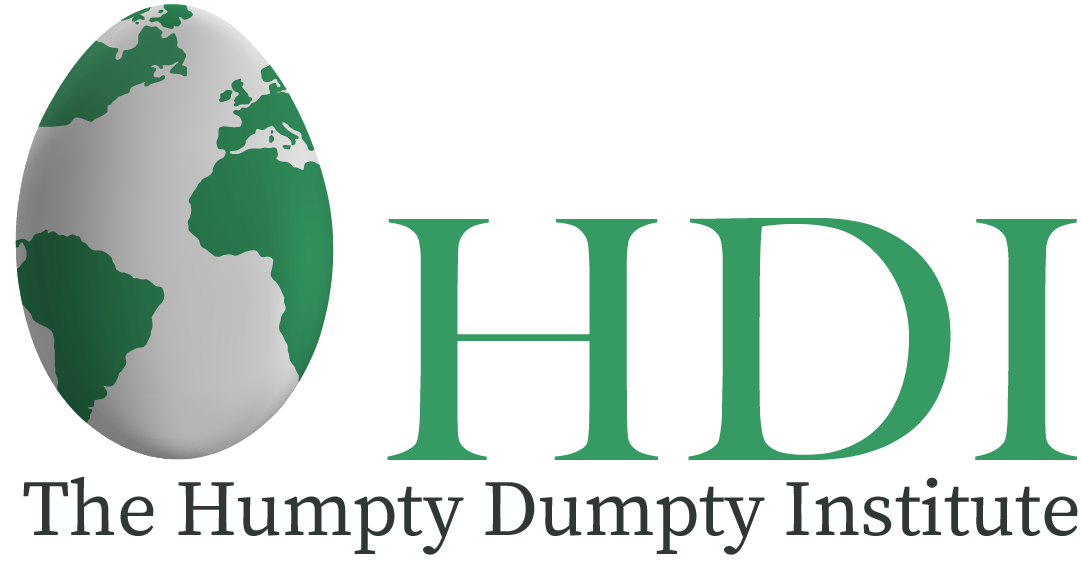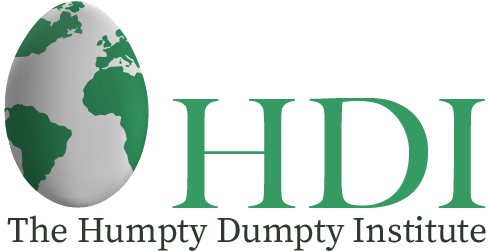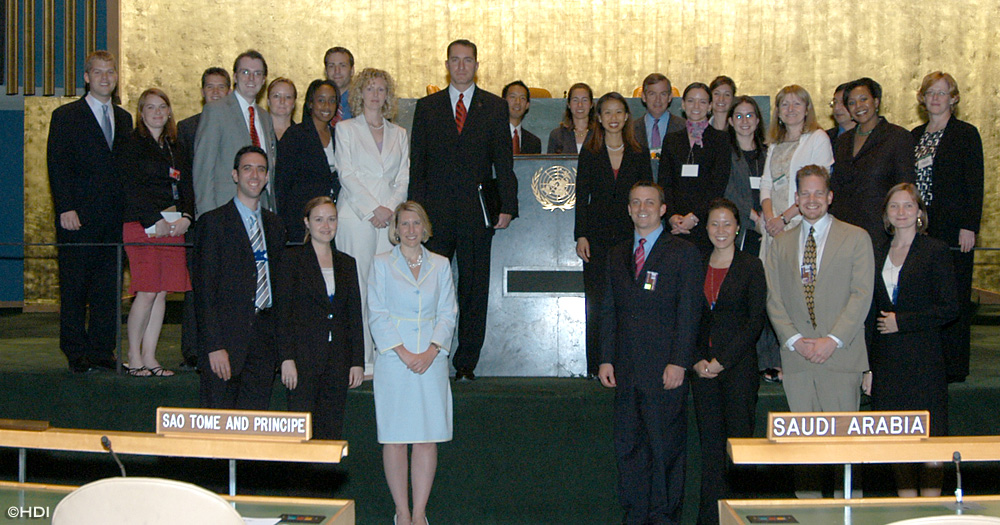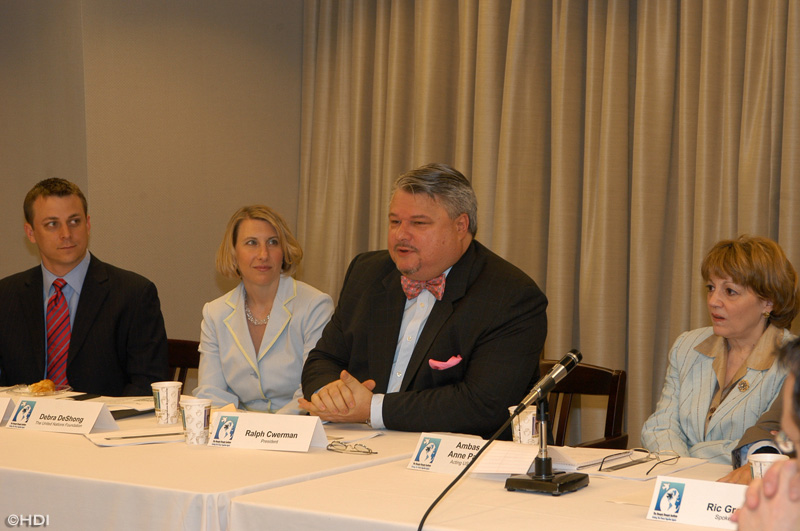House & Senate Press Secretaries
Executive Summary
In a little more than six years, Humpty Dumpty’s popular Congressional Visits to United Nations Headquarters have sponsored trips by almost 260 congressional offices. The latest installment – HDI’s 15th such trip – focused on an important staff constituency often overlooked: House and Senate Press Secretaries and Communications Directors. In partnership with the U.N. Foundation, HDI sponsored a series of briefings at the U.S. Mission and at U.N. Headquarters with senior U.S. diplomats, high-level U.N. officials, and spokesmen from a number of U.N. agencies and departments. The intent of this program was to give congressional spokesmen an opportunity to view first-hand the inner workings of the U.N. while providing them with a network of capable counterparts throughout the U.N. system.
The bipartisan delegation, which comprised of sixteen press secretaries and communications directors from the U.S. House and Senate, concentrated on U.S. priorities at the United Nations, U.N. management and reform, the U.N. budget, the upcoming U.N. Millennium Summit, global humanitarian relief operations, U.N. peacekeeping, and other issues relevant to the U.S.-U.N. relationship. As with previous HDI Congressional delegations, the meetings afforded both Congressional press secretaries and U.N. Staff an opportunity to engage on a variety of topics, in an informal and off-the-record environment.
The Briefings
The 15th Congressional Staff Visit opened with a breakfast briefing at the U.S. Mission featuring remarks by the Acting U.S. Permanent Representative to the United Nations, Anne Patterson. Ambassador Patterson addressed the delegation on the objectives of the U.S. Mission for the United Nations. In particular, she discussed U.S. concerns and challenges regarding Iraq, the crisis in Darfur, relations between Syria and Lebanon, as well as Afghanistan, Haiti and Israel. Among the key points highlighted throughout the day was the importance of distinguishing between the U.N. Secretariat vs. the U.N. Member-States when discussing the work of the United Nations.
Participants at the briefing conveyed U.S. efforts to improve oversight, accountability and flexibility at the Secretariat, and indicated the need to improve the Secretary-General’s discretion over hiring and firing U.N. personnel. Many of her comments reflected the insights of the recently released USIP Task Force on U.N. Reform report, which was praised for its clarity, honesty and fairness.
Richard Grenell, the spokesman for the U.S. Mission to the UN, offered a brief description of his own background and his specific duties. The Spokesman emphasized his intermediary role between the U.S. Congress, the U.S. Mission and the United Nations, and urged future dialogue through his office.
After the breakfast meeting, the delegation moved to United Nations Headquarters for a series of briefs by U.N. officials on Humanitarian Assistance, Peacekeeping Operations, and U.N. Reform and Management. Fred Eckhard, Spokesman for the Secretary-General, welcomed delegates on behalf of the Secretary-General and the U.N. Secretariat. Following Mr. Eckhard’s remarks the delegation met with Kevin Kennedy, Director of the Coordination and Response Division for the Office of the Coordination of Humanitarian Affairs (OCHA).
Mr. Kennedy discussed the challenges facing OCHA in its dual role of coordinating initial response to humanitarian needs and advising the Secretary-General. Referring to the tsunami relief efforts, he pointed out the disparity between the large amount of money that was raised for the victims of this disaster and the less generous donors’ response to other emergencies. Mr. Kennedy stressed the importance of the predictability of response and accountability from donors as well as the need for improved access to difficult regions, which requires more assistance from Member States and from the U.S. in particular. Mr. Kennedy ended his remarks by referring to the issue of U.N. reform, which he said is universally recognized within the U.N. as necessary and is wholly supported by U.N. staff.
David Harland, Chief of the Peacekeeping Best Practices Unit at the Department of Peacekeeping Operations (DPKO), spoke at length to the delegation on a variety of peacekeeping issues, lessons-learned, and trends in U.N. peacekeeping. Addressing the changing nature of conflict in the world and the unique challenges that these developments pose to humanitarian assistance, Mr. Harland described some of the key characteristics of violent conflict in the modern world, noting that since WWII, war has become less frequent, overwhelmingly civil, increasingly confined to Africa and Asia, and generally longer in duration. He also noted that within the last fifty years war has become increasingly correlated with poverty, illustrating the mutual influence of categories such as economic development and peace.
Mr. Harland noted that this continues to be imprecise and volatile work: generally U.N. Peacekeeping operations enjoy a fifty percent success rate with roughly half of all peace treaties negotiated by the U.N. relapsing within five years. While the peacekeeping community is becoming increasingly diverse, (with groups such as NATO and the African Union playing more active roles), the tasks of operations remain largely the same, including prevention, public order, political transition and public administration as discrete stages for moving members of a community towards peaceful co-existence.
Chris Burnham, the recently-appointed U.N. Under-Secretary General for Management, gave an expansive overview of current issues in U.N. Management. Central to the briefing were issues of accountability, transparency, and ethics. Mr. Burnham acknowledged the lack of internal accounting standards as well as regular ethics training, and emphasized the need for outsourcing various non-core U.N. activities that can be more efficiently done by the private sector. In addition, Mr. Burnham stressed the need for a cost-efficient, uniform accounting system. Giving examples from his prior experience in the private and public sector, he touched upon various aspects of the reform proposals and talked about the role the U.N.’s Budget Committee plays in addressing these issues.
Participants in HDI’s 15th Congressional Delegation closed the day with a peer-to-peer working luncheon, followed by a tour of the Secretariat at U.N. headquarters. The luncheon provided another valuable networking opportunity for U.N. and Congressional staff in a relaxed setting. In addition, during the luncheon, spokesmen from the U.N. Departments of Peacekeeping, Political Affairs, Disarmament Affairs, the Secretary-General’s Office and Public Information spoke about their work, emphasizing recent achievements as well as challenges to the future effectiveness of their respective offices.
Schedule
Thursday, June 16
6 pm
Check in to Murray Hill Suites Hotel
Location: 149 E 39th St. (between Lexington Ave. & 3rd Ave.)
6:30 pm
Cocktail Reception
Featuring Spokesmen from U.N. Missions and Program Briefing Participants
Location: U.S. Mission to the United Nations
140 East 45th St., between Lexington & 3rd Aves, 8th Floor
Friday, June 17
7:30 am
Meet in hotel lobby
8 – 9:30 am
Breakfast Briefing: U.S. Priorities at the United Nations
Ambassador Anne Patterson, U.S. Acting Permanent Representative
Richard Grenell, Spokesman for the U.S. Mission
Location: U.S. Mission to the United Nations
9:50 – 10 am
Welcoming Remarks
Fred Eckhard, Spokesman for the Secretary-General
Location: 27th Floor Boardroom
10 – 10:50 am
Overview of U.N. Humanitarian Assistance Worldwide
Kevin Kennedy, Director, Coordination and Response Division, OCHA
Location: 27th Floor Boardroom
11 – 11:50 am
Overview and Updates on U.N. Peacekeeping Operations
David Harland, Chief, Peacekeeping Best Practices Unit
Location: 27th Floor Boardroom
12 – 12:50 pm
Current Issues in U.N. Management
Christopher Bancroft Burnham, Under-Secretary-General for Management
Location: 27th Floor Boardroom
1 – 2:30 pm
Peer-to-Peer Working Luncheon
Featuring spokesmen from the Departments of Peacekeeping, Political Affairs, Disarmament Affairs, the Secretary-General’s Office, and Public Information
Location: Delegates’ Dining Room Number 6
2:45 – 3:30 pm
United Nations Headquarters Site Inspection Tour
3:30 pm
Program concludes
Participants:
Congressional Press Secretaries – Senate
Amanda Halligan, Office of Senator John Cornyn (R-TX)
Stephen Hourahan, Office of Senator Lincoln Chafee (R-RI)
John Reid, Office of Senator George Allen (R-VA)
Rachel Reiter, Office of Senator Chuck Hagel (R-NE)
Barbara Riley, Office of Senator John Sununu (R-NH)
Adam Sharp, Office of Senator Mary Landrieu (D-LA)
Mike Yuen, Office of Senator Daniel K. Inouye (D-HI)
Congressional Press Secretaries – House of Representatives
Will Adams, Office of Representative Tom Tancredo (R-CO)
Ben Allen, Office of Representative José E. Serrano (D-NY)
Lindy Birch, Office of Representative James E. Clyburn (D-SC)
Myra Dandridge, Congressional Black Caucus, Office of Representative Mel Watt (D-NC)
Brad Keena, Office of Representative Dennis Rehberg (R-MT)
Dany Khy, Office of Representative Betty McCollum (D-MN)
Rebecca Kutler, Office of Representative Adam Schiff (D-CA)
Anouck McCall, Office of Representative Ted Poe (R-TX)
Greg McCarthy, House International Relations Committee – Majority
Kerry McKenney, Office of Representative Don Payne (D-NJ)
United States Mission to the United Nations
Anne Patterson, Acting U.S. Permanent Representative
Ric Grenell, Spokesman for the U.S. Mission to the UN
Tom Schweich, Chief of Staff
Bill Brencick, U.S. Deputy Representative to ECOSOC
Lynne Gadkowski, Staff Aide to Ambassador Patterson
Joe Merante, Deputy Director of Communications
Gordy Olson, Deputy Political Counselor
Tom Repasch, Deputy Counselor for U.N. Management and Reform
Chris Backemeyer, Press Advisor
Ben Chang, Press Officer
United Nations Briefings
Chris Bancroft Burnham, Under-Secretary-General, Department of Management
Fred Eckhard, Spokesman, Executive Office of the Secretary-General
David Harland, Chief, Peacekeeping Best Practices Unit
Kevin Kennedy, Director, Coordination and Response Division, OCHA
Peer-to-Peer Luncheon
Nick Birnback, Spokesman, Department of Peacekeeping
Chris de Bono, Special Assistant to the Under-Secretary-General, Dept. of Public Information
Christian Clark, Public Information Officer, Office for the Coordination of Humanitarian Affairs
Jaya Dayal, Special Assistant to the Director of Communications, Executive Office of the Secretary-General
Stephane Dujarric, Deputy Spokesman, Office of the Spokesman of the Secretary-General
Nick Hartmann, Policy Advisor on Reform, Office of the Deputy Secretary-General
Adrian Hills, Senior Policy Advisor on Reform, Office of the Deputy Secretary-General
David Morrison, Director of Communications, United Nations Development Program (UNDP)
Peter Smith, Advisor, Department of Management
Mark Suzman, Executive Office of the Secretary-General
Erin Trowbridge, Communications Manager, U.N. Millennium Project
The U.N. Foundation / Better World Campaign
Elizabeth Alexander, Press Secretary
Kriston Alford, Legislative Affairs Manager, Better World Campaign
Debra Deshong, Director of Communications and Public Affairs
Christina Lonigro, Press Secretary and U.N. Liaison
Susan Myers, Legislative Director, Better World Campaign
Amy Weiss, Vice President of Public Affairs
The Humpty Dumpty Institute
Ralph L. Cwerman, President
William Rigler, Executive Director
Caroline Gosselin, Program Manager
Chi-Hoon Kim, Associate
Nathan Robb, Associate
Roy Wiesner, Associate



















